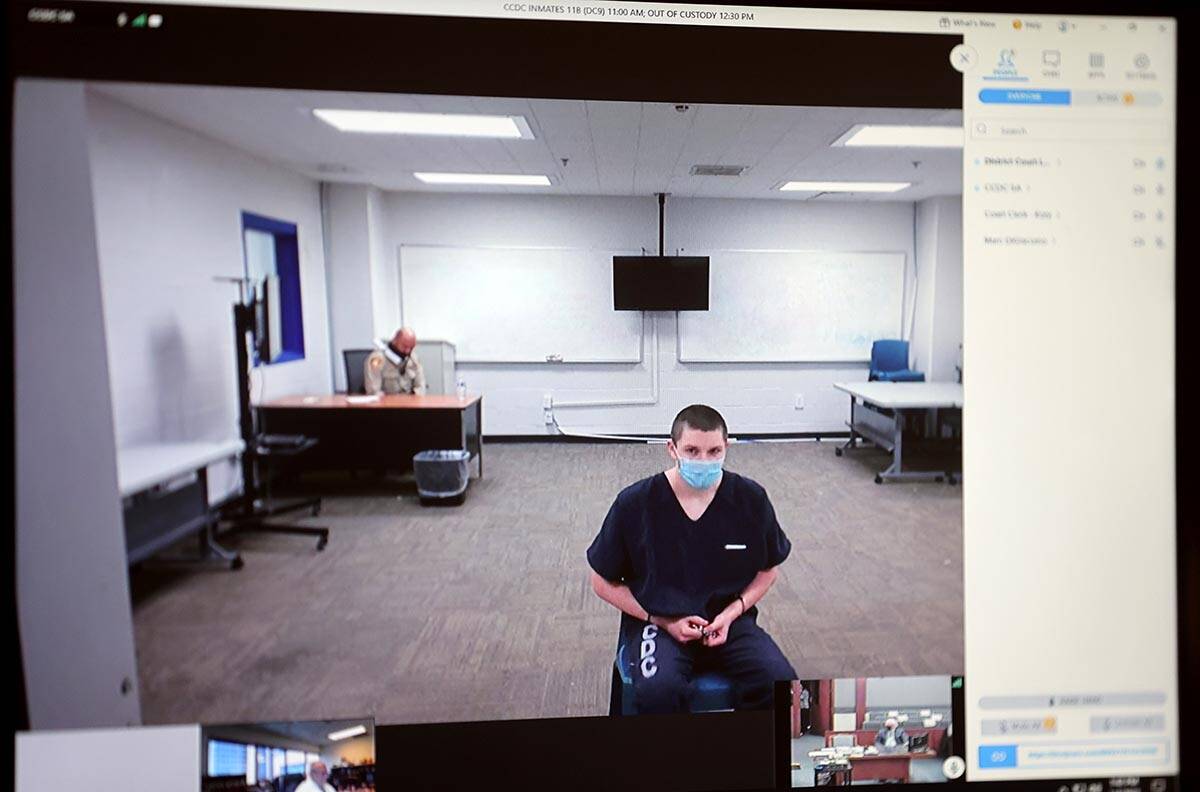Doctor testifies on teen murder suspect’s diabetes care in jail
A pediatric endocrinologist testified Tuesday that the Clark County Detention Center is not properly managing a 16-year-old boy’s diabetes, leading to dangerously high blood sugar levels since he was arrested more than four months ago.
“At the time of his initial incarceration, I don’t think he was monitored very much at all,” said Dr. Henry Rodriguez, clinical director of the University of South Florida’s Diabetes Center. “That increased to two to three times a day, and more recently it appears that he has been monitored approximately four times a day.”
Children with Type 1 diabetes, like Ethan Goin, need to have their blood sugar levels tested at least four times a day, Rodriguez said. But medical records provided to Rodriguez have not properly recorded the timing of his blood sugar tests, meals, and when is being given insulin, the doctor testified during an evidentiary hearing regarding the teenager’s treatment at the jail, which is operated by the Metropolitan Police Department.
Goin was arrested Aug. 28 and has been charged with murder.
According to court records, Goin’s blood sugar levels have been high enough to show symptoms of hyperglycemia nearly every day he has been tested since late August.
People usually start to show symptoms of hyperglycemia once their blood sugar reaches 200 milligrams per deciliter. While incarcerated, Goin’s tests have shown levels at 300 milligrams and above at least once a day for more than 100 days, court records show.
Long-term hyperglycemia can cause damage to the eyes and kidneys, eventually leading to blindness and kidney failure, Rodriguez said.
Goin’s public defender, Sarah Hawkins, filed an emergency motion requesting District Judge Cristina Silva to either release Goin from custody, transfer him to a psychiatric hospital or juvenile facility, or to order Metro to treat the 16-year-old’s diabetes with the help of a pediatric endocrinologist.
In the meantime, Goin has been kept in his cell 23 hours a day in the jail’s medical unit, according to the motion.
Hawkins wrote in court documents that without intervention, the detention center’s treatment of Goin “may severely injury or kill this particularly vulnerable child.”
Metro spokesman Aden OcampoGomez said the department disputes the allegations in Hawkins’ motion but declined to comment further.
Denied insulin pump
Goin is accused of leaving school the day before he was arrested and fatally stabbing 48-year-old Vergel Guintu in his Summerlin home. Goin later told police he did not remember what happened inside Guintu’s home. Hawkins has said Goin had been hospitalized previously for “mental health issues” and was most recently released from a hospital nine days before Guintu’s death.
After his arrest, Goin was hospitalized at University Medical Center for diabetic ketoacidosis, a diabetes complication Rodriguez said can occur within hours of blood sugar levels spiking.
In September, Justice of the Peace Harmony Letizia issued an order requiring Metro to allow Goin access to his insulin pump, a device attached to the skin that administers small doses of insulin throughout the day. Goin’s mom delivered his pump to the detention center, but Metro did not give him the device.
In November, Silva granted a sealed motion filed by Metro to reverse the order, allowing Metro to deny Goin access to the pump.
Metro’s lawyer, Martina Bauhaus, has indicated that officials do not want to give Goin the pump out of concern for his mental health, since he would be able to give himself an overdose of insulin. During questioning Tuesday, Rodriguez said doctors typically will not allow a suicidal patient to have an insulin pump.
Bauhaus also said Goin has refused a diabetic diet multiple times and has been uncooperative during testing. Before Silva quashed the prior court order, Metro filed a sealed motion titled “Defendant Has Been Receiving Appropriate Medical Treatment and Any Issues Have Been Caused by Defendant’s Behaviour,” according to Hawkins’ motion.
However, Rodriguez said the medical records provided to him do not indicate exactly why Goin’s blood sugar is consistently high.
When someone does not have an insulin pump, they will generally test their blood sugar levels and take insulin to coincide with meals, Rodriguez said. Either withholding insulin or taking insulin outside of meal times can affect blood sugar levels, he said.
“In most cases, I can presume honestly that his levels that are particularly high are occurring when eating without appropriate administration of insulin, perhaps in dose, perhaps in timing,” Rodriguez said. “Both those factors are critical.”
The evidentiary hearing is expected to continue Thursday with testimony from Dr. Larry Williamson, a doctor at the detention center.
While Metro has said Goin is receiving proper treatment in the jail, the department’s lawyer admitted during Tuesday’s hearing that Goin’s blood sugar levels are not normal.
“I think we all agree that the defendant’s diabetes is not under control at this time,” Bauhaus said.
Contact Katelyn Newberg at knewberg@reviewjournal.com or 702-383-0240. Follow @k_newberg on Twitter.





























